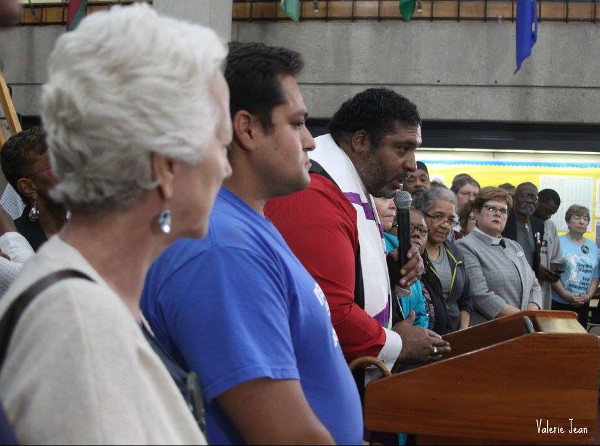
PHOTO/VALERIE JEAN
DETROIT — The General Baker Institute held its 4th annual General Baker, Jr., Tribute at the Charles H. Wright Museum of African American history in Detroit on September 6. The Institute provides education for the community, especially youth, in the spirit of the revolutionary life and contributions of General Gordon Baker Jr., (September 6, 1941 to May 18, 2014) by making widely known the human rights struggles he waged and his passion for putting into practice what has been learned.
This year’s Tribute embraced the Poor Peoples Campaign in its organizing drive across America. The event began with excerpts from an interview of General Baker where he summed up his years of organizing in the auto plants of Detroit saying, “ . . . all the work you’ve done to advance your cause inside the plant for jobs and things are now being eliminated en masse by robots and the whole struggle for equality at the workplace is transformed into a struggle for survival.”
Maureen Taylor, Chair of the Michigan Welfare Rights Organization, one of the panelists, spoke of housing auctions happening while homeless people stand among vacant homes with signs that read, ‘will work for food.’ “Well it’s legal for you to be poor, hungry, live in a right to work state where it’s alright for you to earn less, work harder, have no benefits and perhaps die at your job. That’s legal.” But if you take the house, move in, and fix it up, “and the neighbors start to like you, what you’re doing is illegal.”
Panelist Rev. Edward Pinkney, president of Black Autonomy Network Community Organization (BANCO), spoke on the need for unity in the fight against the corporations saying, “A lot of us today don’t know who the enemy is. We sit around here fighting with each other over nothing. Do you know that this divides us up? If it concerns my people—all people—I don’t care if you’re Black, white, red, blue, brown, yellow, you’re my people. We have to learn to come together, fight together and we can win this thing. It’s more of us than it is of them.”
“In the uniting of the most of us . . . we can change the direction of this nation,” said Poor People’s Campaign co-founder and panelist Rev. Dr. Liz Theoharis. “We are connecting up,” she continued, “with grassroots people across this country from 37 states, and saying, “in the spring of 2018 starting on Mother’s Day, May 13, and going for 40 days until the summer solstice on June 21, can we have 1,000 people in each state from 25 states and 2,500 people in Washington, D.C., engaging in moral resistance, direct action, non violent resistance? And the answer has been a resounding yes.”
The final panelist, Rev. Dr. William J. Barber II, President of the North Carolina NAACP, pointed out the need to change the moral agenda in this country. “Did you know,” he asked, “that 250,000 people die every year from poverty? Did you know that for every one million people denied Medicaid expansion, 6,000 die? So a group of us as clergy say if anyone from our church dies for lack of healthcare, we’re going to ask the family to have an open casket funeral, we’re going to invite the media in and say this is what murder by government looks like.”
“That reality,” said Maureen Taylor, “will be a guiding truth that each year on Sept 6, we validate what we believe and try to convince others that they need to organize if they plan to survive.”
John Williams of the General Baker Institute said at the closing that all are welcome to attend the educational program of the General Baker Institute. Contact @GeneralBakerInstitute for information.
